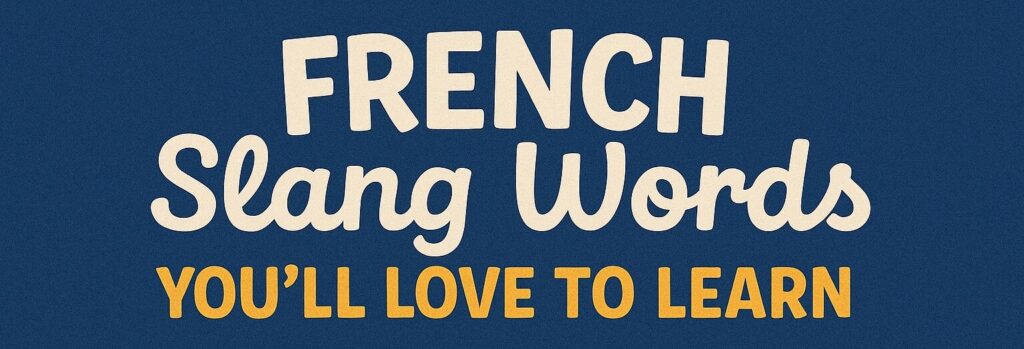
If you’ve ever watched a French movie or overheard a group of young Parisians, you’ve probably heard a few expressions that didn’t sound like anything from your textbook French class. That’s because the real magic of learning French lies in mastering French slang—the colorful, quirky, and authentic way native speakers actually talk.
Unlike the polished phrases you’ll find in formal lessons, French slang words bring your conversations to life. They make you sound more like a local and less like a tourist with a phrasebook. Whether you’re a beginner or brushing up your skills, adding some everyday French slang to your vocabulary is a game-changer.
Let’s dive into some of the most common French expressions you’ll hear everywhere—and maybe even start using today!
Why Learn French Slang?
Learning slang isn’t just for fun (though it is fun). It’s one of the best ways to:
- Speak French like a native: Native speakers use slang constantly, in conversations, text messages, and social media.
- Connect in conversations: Slang adds emotion and rhythm to speech, making you sound more relaxed and confident.
- Understand French culture: Movies, music, and comedy often rely on slang to express humor, sarcasm, and real-life situations.
- Avoid awkward moments: Some slang has double meanings or might be inappropriate in certain contexts. Learning when (and when not) to use it helps you navigate conversations smoothly.
Learning conversational French means learning the real language people speak every day—slang included.
Most Common French Slang Words You’ll Hear Everywhere
1. Mec / Meuf
These are slang equivalents of “guy” and “girl.”
- Mec = guy
- Meuf = girl (verlan form of femme)
📌 Example:
“Ce mec est sympa !” – That guy is nice!
“C’est une meuf cool.” – She’s a cool girl.
Cultural tip: While “mec” is widely accepted, “meuf” can sound a bit edgy depending on context. Best used among friends.
2. Bof
An all-time classic for expressing indifference. It means “meh” or “so-so.”
📌 Example:
“Tu as aimé le film ?”
“Bof, pas trop.” – Did you like the movie? Meh, not really.
Perfect when you’re unimpressed or feeling neutral.
3. Ouf
Crazy, wild, unbelievable… “ouf” covers it all. It’s actually verlan (French backwards slang) for fou (crazy).
📌 Example:
“C’était un concert ouf !” – That was an insane concert!
Mastering verlan is key if you want to learn French slang like a native.
4. Fringues
A very common slang word for “clothes.”
📌 Example:
“J’adore tes fringues !” – I love your outfit!
You’ll hear this often in casual conversations, especially among young people.
5. Bosser
This is the slang cousin of “travailler” (to work).
📌 Example:
“Je dois bosser ce week-end.” – I have to work this weekend.
Great for sounding casual yet productive—like a real Parisian on a Monday morning.
6. Kiffer
To “kiffer” something means to really enjoy or love it.
📌 Example:
“Je kiffe ce resto !” – I love this restaurant!
Derived from Arabic, it’s now a beloved word in French culture, especially among younger generations.
7. Truc
A go-to filler word meaning “thing” or “stuff.”
📌 Example:
“C’est quoi ce truc ?” – What is that thing?
You’ll hear this word in nearly every casual conversation. It’s vague, friendly, and versatile.
8. T’inquiète
Short for ne t’inquiète pas (don’t worry). It’s casual, quick, and reassuring.
📌 Example:
“Désolé, je suis en retard.”
“T’inquiète, ça va.” – Sorry I’m late. Don’t worry, it’s fine.
Slang and kindness in one neat phrase.
9. Ça marche
Literally “that works,” but in slang, it means “okay” or “deal.”
📌 Example:
“On se retrouve à 19h ?”
“Ça marche !” – Meeting at 7? OK!
A must-know phrase for real-life French conversations.
10. Grave
Used for emphasis, similar to “totally,” “seriously,” or “so much.”
📌 Example:
“C’était grave bien !” – That was seriously good!
It’s flexible and sounds super native when used naturally in conversation.
French Slang Tips for Beginners
Before you start sprinkling “ouf” and “kiffer” into every sentence, keep these tips in mind:
- Avoid slang in formal settings: Business meetings, interviews, and official correspondence require standard French.
- Be cautious with regional slang: What’s common in Paris might not be understood—or might even mean something different—in Marseille or Lyon.
- Listen first, speak later: Observe how native speakers use slang before trying it yourself.
- Practice with locals or online communities: Language exchanges or online forums can give you real feedback.
- Use trusted resources: Apps, YouTube channels, and movies help, but structured classes provide context and corrections.
🎓 Want structured practice? Explore the HERE AND NOW – The French Institute or join our cultural workshops to practice slang in real-world scenarios.
Conclusion
Learning French slang isn’t just about sounding cool—it’s about connecting more deeply with the language and the people who speak it. Whether you’re chatting with friends, traveling through France, or watching a Netflix series in French, slang helps you feel truly in tune with the culture.
So go ahead—start using these expressions in your conversations and watch your French become more fluent, more natural, and a whole lot more fun.
Ready to speak French like a local? Check out our interactive classes and resources at HERE AND NOW – The French Institute and start your journey toward speaking real, living French today!
CONTACT US now!! For more updates, subscribe to our YOUTUBE channel and follow us on INSTAGRAM.
